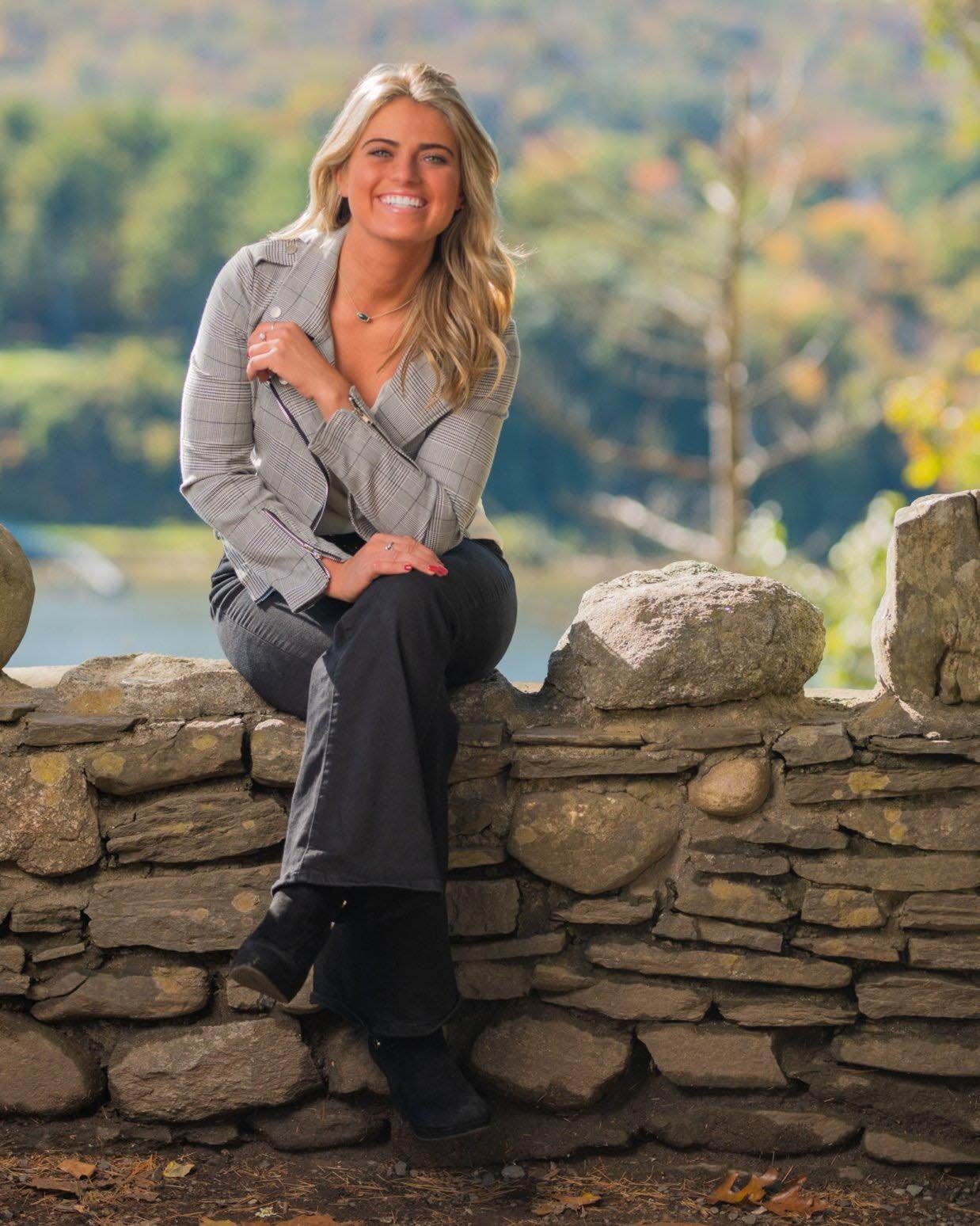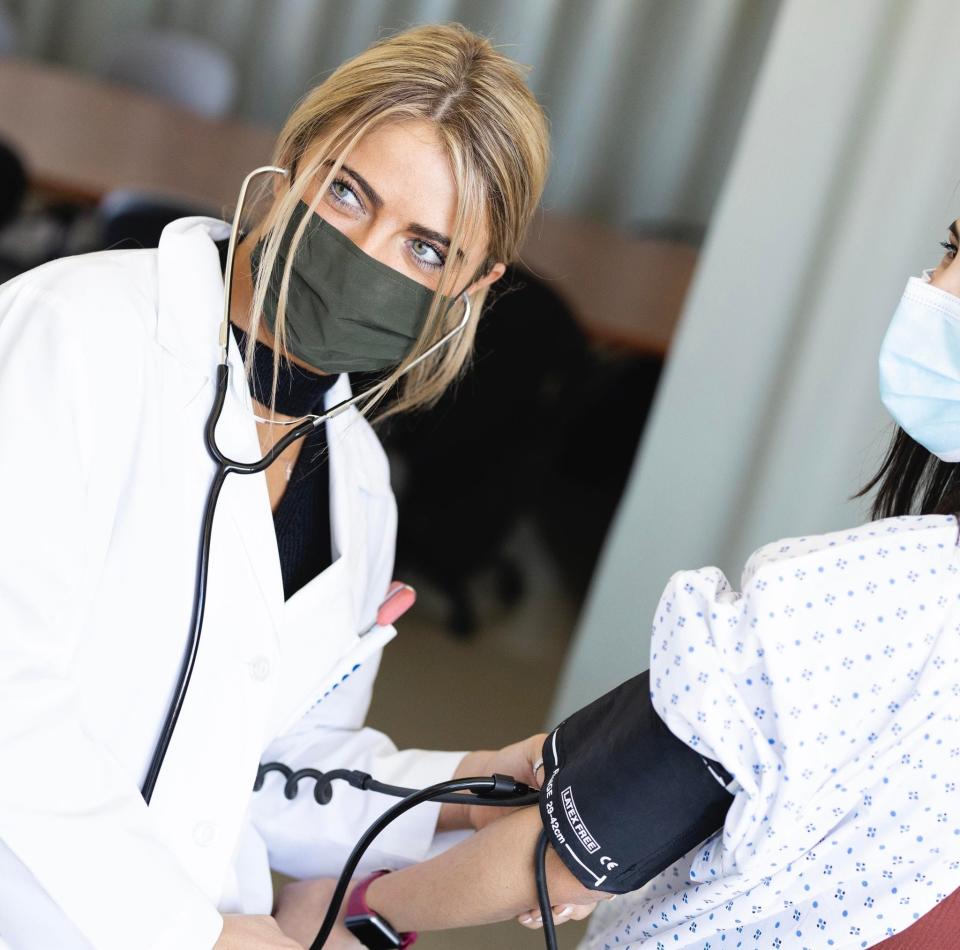‘They encouraged me to make a difference’: Connecticut Children’s nurse inspired by patients

Alexandra Ford is one of USA TODAY’s Women of the Year, a recognition of women across the country who have made a significant impact. The annual program is a continuation of Women of the Century, a 2020 project that commemorated the 100th anniversary of women gaining the right to vote. Meet this year’s honorees at womenoftheyear.usatoday.com.
Alexandra Ford knows firsthand how critical quality healthcare is and how attentive, empathetic nurses can ease anxieties for patients and families alike.
As college student, she was the caregiver for her great-grandmother, accompanying her medical appointments and hospital stays. That experience led her into nursing at Quinnipiac University, and then into oncology post-graduation at Connecticut Children’s Medical Center in 2020. She had been there just three months as a registered nurse when COVID-19 hit.
She tapped into what she learned not only in school but also as a caregiver to remain dedicated to her work and to her future, inspired by the children facing life-threatening illnesses she worked with every day.
The questions and answers have been edited for clarity and length.
What got you into medicine?
During my sophomore and junior years at Quinnipiac, I took care of my great-grandmother who was suffering from dementia. My great-grandmother raised me so my mom and dad could work, we were very close. When I was going with her to her doctor's appointments and hospital stays, and I saw a difficult side of healthcare. During one hospitalization she moved between 32 different hospital areas during one three-month stay. On a more positive side, I found those nurses that I felt safe leaving her in the hands of when I went home. From that time on, I wanted to be like those nurses. I wanted to be a nurse that others felt safe and comfortable with.
When did you get involved with Connecticut Children’s?
From that point on, I saw how important a diagnosis is, not only for the patient, but for family, and how everyone’s going through it. It's not just an individual diagnosis. I looked into several healthcare fields where patient and family education is important, that's when I found oncology. I applied for the Susan D. Flynn Oncology Fellowship, an eight-week program which is sponsored by Fred Flynn, a man who lost his wife to cancer. I applied and he sponsored one position at Connecticut Children’s. It was an honor to be chose for that internship. I worked there my junior year into my senior year. I shadowed all different areas of oncology from hospice, which was super emotionally challenging, to chemotherapy administration. I also did a research project through the eight weeks and presented it to the hospital about the importance of educating the family. When the patient leaves the hospital, the family is now the nurse and the doctor at home.
I applied to be a patient tech, and I worked my senior year. My position was daily care, and talking to the patients. I learned so much. I was then hired as a registered nurse in 2019 and I’ve been there ever since. Three months later, COVID hit.

How was it adapting to COVID, being someone who is relatively new in the medical field?
It was difficult at first. I didn’t directly care for as many COVID-positive patients as other nurses, but I saw the impact in a newly diagnosed 7-year-old, who had to choose between their mom, dad, sister, or brother to sit with them during that conversation. I saw the emotional impact and the isolation with the oncology patients.
Who paved the way for you?
My oncology patients. I went in thinking I’m going to make their lives easier and better, and at the end of the day, when I sit back, they changed my life. They put my life into perspective and (taught me) how to appreciate the little things. One of my patients told me to find a vacation in my everyday life; to find something special about every single day. They encouraged me to do more, to challlege myself. I am now, so I am in my second year of my doctorate to be a family nurse practitioner in oncology.
What is your proudest moment?
My proudest moment was getting the Flynn Fellowship. This afforded me the opportunity to be exposed to oncology. I am also proud of the strength that I didn't realize I had. One of my very first patients came back to visit me, I was walking down the hall and I walked right past her. I didn’t even recognize her because her hair grew back and she was healthy. She said my name and I turned and looked at her. At that moment, my purpose made sense.
What is your definition of courage?
The kids and their parents on this oncology floor are my definition of courage. Despite the most difficult diagnosis and prognosis, these kids are resilient, brave, warriors and their parents carry the most devastating weight upon their shoulders yet, they show up and provide support to their children and trust that we will do our best to save their children's lives.
What is your guiding principle?
I think about this every day especially through nursing and COVID and society today. (My guiding principle) is to be consistently kind, as I’ve seen that life’s most difficult challenges are invisible. I see the patient families and on the outside, they look totally normal, and they’re healthy, but their firstborn is fighting an illness.
Who do you look up to?
I look up to my patients that are struggling and fighting every day. I look up to those kids' parents who I am privileged to know, humbled that they trust me. I look up to the other nurse practitioners at the hospital that have seen the devastating effects of COVID and kept going. I look up to my younger sister who had just started high school when Covid struck, for being so strong going; it’s hard to learn and gain social skills from a virtual platform. I look up to the younger generation, whether they’ve been sick or healthy. They lost valuable time.
How do you overcome adversity?
I have a problem-solving personality and I’m always trying to brainstorm solutions. I used to be a more reactive person and when adversity hit, I thought it’s the end of the world. I learned that giving yourself that period of being reactive is harmful. Depending on others and using the resources around you, like coworkers and family and friends is important, especially with everything going on in today’s world.
The pandemic has been a problem for everyone, especially women. What has helped you?
What has helped me is having a purpose. Being able to make a difference, no matter how small, has helped me through this crazy time. Some people might say that they’re only helping one other person, but I believe a chain reaction is so important. Finding purpose in yourself can really help the world be a better place. Just one act really goes a long way and causes that ripple effect.
What advice would you give your younger self?
Sometimes time goes by so fast. Appreciate every movement as much as you can. Appreciate being able to go to work and appreciate being able to go back to school and appreciate and being able to have breakfast in the morning. Until I started facing the things I see every day, I didn’t realize how much I should be thankful for.
What’s next in your career?
Right now, I’m a hematology and oncology nurse at Connecticut Children’s, and in 2023 I’ll be graduating with my masters. It’s not that I don’t love being a bedside nurse, but I’ve seen so much already in my short time of being an RN that I hope to gain a greater autonomy to make a greater difference in the oncology population. There’s research opportunities with the new infectious disease research with COVID and how that relates to cancer. It’s such a revolutionary medical field and I hope to continue to try to make a difference.
Women of the Century: Helen Keller, Katharine Hepburn, Barbara McClintock on Connecticut list of influential women
Explore the project
This article originally appeared on The Bulletin: Connecticut Children's nurse inspired by pediatric patients during COVID

